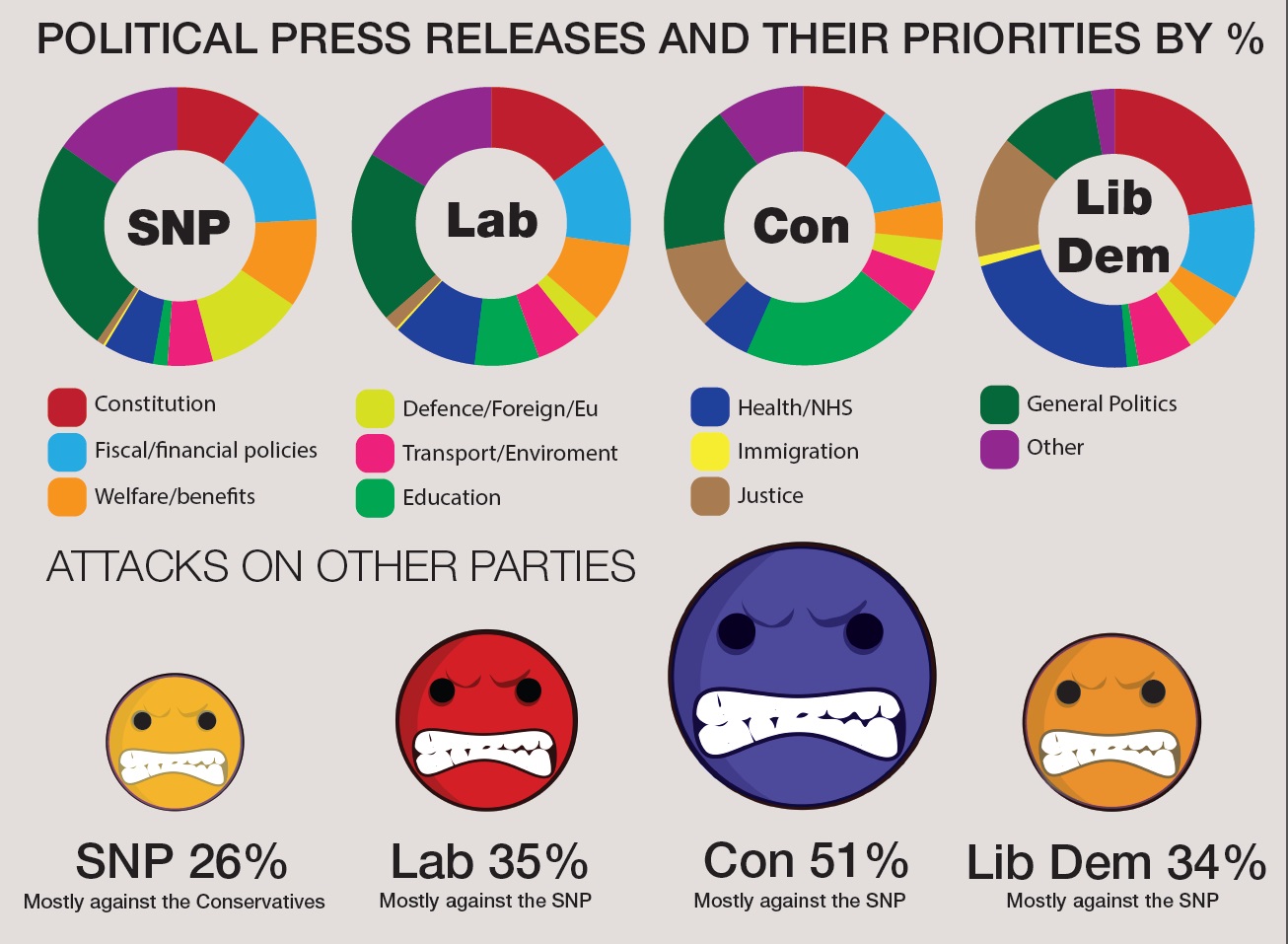
It is, popular wisdom suggests, a party obsessed by the constitution.
The SNP, its opponents say, is a single-issue campaign, every single move calculated to bring Scotland closer to independence.
However, a detailed analysis of public pronouncements made by parties north of the border reveal it is not the nationalists, but their rivals, who talk most about constitutional matters.

We have looked at every single press release issued by the SNP, Scottish Labour, Scottish Conservatives and the Scottish Liberal Democrats since April 1 of this year.
And our checks show that during this period - which includes the general election and its aftermath - that the SNP were obsessed, but with austerity, not independence.
The party devoted just 10 per cent of its press releases to independence, devolution, English Votes for English laws. So did the Conservatives.
By contrast, Labour referred to constitutional issues in 15 per cent of its releases, the Lib Dems in 22 per cent.
Craig McAngus, research fellow at the Centre on Constitutional Change and the University of Stirling, said: "There is an irony there that the SNP are painted as the party obsessed with the constitution when in reality they are speaking about it the joint least.
"Clearly Labour wanted to paint the SNP as the party that mentions independence all the time.
"They were probably trying to shore up many of its own voters, especially those that voted no, regarding the potential of a second independence referendum."
Our analysis is designed to show the topics which parties decide are important themselves, rather than those which pundits tell us they hold most dear.
Under First Minister Nicola Sturgeon, the SNP's main public focus has been on austerity.
So welfare and fiscal policies together featured in over 25 per cent of SNP's press releases, but just 20 per cent of of Labour's.
The Nationalists, meanwhile, appeared less keen to highlight their own record in government, with devolved issues of education, justice and health collectively making up only 8.3 per cent of their press statements. That contrasted with the Scottish Conservatives, who issued more than one in five of their press releases on education alone.
The Lib Dem focused a similar proportion of their releases on the NHS. Both Conservatives and Lib DEms chose not to make welfare a big talking point with only 4.5 per cent and 3.7 per cent of mentions respectively. Immigration was of little interested north of the border in the election and post-election period. Only two releases mentioned the issue.
Dr McAngus said: "I thought it was interesting that Labour talk more about devolved issues than the SNP. There is an interesting dynamic there as the SNP talk about reserved issues more but not as much about devolved matters."
Perhaps because the period we studied coincided with an election, a very large proportion of the press releases amounted to attacks on other parties. But here too there were clear signs that the SNP focused on its own game more than on that of other parties.
Only 26 per cent of all SNP press releases were attacks, compared with 35 per cent for Labour and more than half for the Conservatives. The SNP concentrated its fire on the Tories; all the other parties targeted the SNP. However, the SNP still issued more than twice as many ads attacking other parties than they did devoted to welfare. Labour issued four times as many attack ads as those focusing on welfare.
Dr McAngus said: "The fact the SNP attack other parties the least is a bit of a surprise."
The number of press releases issued varied from 402 from the SNP and 291 from Labour to just 98 from the Conservatives and 79 from the Lib Dems. Figures from the Scottish Greens were not available.


Why are you making commenting on The Herald only available to subscribers?
It should have been a safe space for informed debate, somewhere for readers to discuss issues around the biggest stories of the day, but all too often the below the line comments on most websites have become bogged down by off-topic discussions and abuse.
heraldscotland.com is tackling this problem by allowing only subscribers to comment.
We are doing this to improve the experience for our loyal readers and we believe it will reduce the ability of trolls and troublemakers, who occasionally find their way onto our site, to abuse our journalists and readers. We also hope it will help the comments section fulfil its promise as a part of Scotland's conversation with itself.
We are lucky at The Herald. We are read by an informed, educated readership who can add their knowledge and insights to our stories.
That is invaluable.
We are making the subscriber-only change to support our valued readers, who tell us they don't want the site cluttered up with irrelevant comments, untruths and abuse.
In the past, the journalist’s job was to collect and distribute information to the audience. Technology means that readers can shape a discussion. We look forward to hearing from you on heraldscotland.com
Comments & Moderation
Readers’ comments: You are personally liable for the content of any comments you upload to this website, so please act responsibly. We do not pre-moderate or monitor readers’ comments appearing on our websites, but we do post-moderate in response to complaints we receive or otherwise when a potential problem comes to our attention. You can make a complaint by using the ‘report this post’ link . We may then apply our discretion under the user terms to amend or delete comments.
Post moderation is undertaken full-time 9am-6pm on weekdays, and on a part-time basis outwith those hours.
Read the rules hereComments are closed on this article